Much of the existence of race can trace its origins to the colonization of the Americas. The categories and meanings of race have changed over time and geography. Suffice it to say, no one was white or black until the colonization process needed ways of differentiating various rights, privileges, social, and legal standings between various laborers. Fifteenth century European countries were not the modern nation states of today, so there was no concept of being “Italian,” for instance. People identified with regional areas, as Calabrese, Genoan, etc. When Europeans did use the term “race” it was employed to talk about tribal groups, such as the “Teutonic races” and while those categories might have been used as indicators of “types” they were by no means seen as limiting or indicative of innate inferiority. Religion and class were the most important divisions, and race as we know it had not been invented.
It’s important to note that dating back to the first millennium AD, Africans existed in in Europe, and, from about 711 AD to 1492 most of Spain was under Moorish control. Consequently, the Spanish colonizers who ventured forth to “settle” lands outside of Europe did so while harboring color prejudice associated with their subjugation. But racial categories as we now know them, had not yet been used to justify the denial of basic rights, which were controlled through the church. By contrast, Europeans knew Africa to be a wealthy, advanced continent in many areas of development and education. When the American colonizers started the Atlantic slave trade, they weren’t simply grabbing people out of the trees, as many of us were led to believe. They were targeting well established kingdoms weakened by internal strife, with citizens who had the skills required to develop the colonial enterprises, including advanced agricultural practices, metallurgy, navigation and shipbuilding, as well as the resources from the lands themselves. Race didn’t begin to take on its modern meanings until the mid-16th century, and the terms and meanings that we now give to race in the U.S. weren’t concretized until the early 20th century.

No comments:
Post a Comment